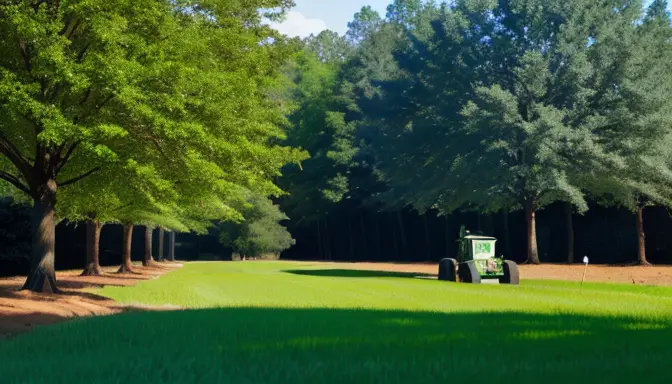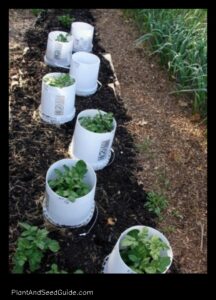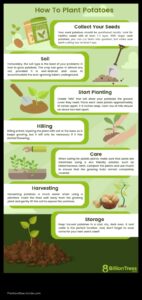Are you ready to transform your Georgia lawn into a lush oasis? Expert advice on planting grass seed in Georgia is your key to success. From choosing the right grass seed varieties to dealing with common challenges, we’ve got you covered. Let’s dive in and discover the secrets to a vibrant, healthy lawn that will make your neighbors green with envy!
Choosing the Right Grass Seed Varieties
When it comes to choosing the right grass seed varieties for your lawn in Georgia, it’s essential to consider the unique climate and soil conditions of the region. Different grass types thrive in different environments, so selecting the most suitable varieties can make a significant difference in the success of your lawn. Here are some key factors to keep in mind:
- Warm-Season Grasses: Varieties like Bermuda grass, Zoysia grass, and Centipede grass are well-suited for Georgia’s hot summers and mild winters.
- Drought-Tolerant Varieties: Consider grass seeds that are known for their drought resistance to withstand Georgia’s occasional dry spells.
- Shade-Tolerant Varieties: If your lawn has shaded areas, opt for grass seeds that thrive in low-light conditions to ensure uniform growth.
- Soil Compatibility: Choose grass seed varieties that are compatible with the soil pH and texture in your area for optimal growth.
Consulting with local experts or nurseries can also provide valuable insights into the best grass seed varieties for your specific location in Georgia.
By selecting the right grass seeds tailored to your lawn’s needs, you can set the foundation for a healthy and vibrant green space..

Preparing the Soil for Planting
When it comes to planting grass seed in Georgia, preparing the soil is a crucial step that can significantly impact the success of your lawn. Proper soil preparation creates the optimal conditions for grass seed germination and growth, ensuring a lush and healthy lawn. To get started, here are some essential tips for preparing the soil:
- Soil Testing: Before planting grass seed, conduct a soil test to determine its pH level and nutrient content. This will help you identify any deficiencies that need to be addressed through soil amendments.
- Amending the Soil: Based on the results of the soil test, amend the soil with organic matter, such as compost or peat moss, to improve its structure and fertility. This will provide a nutrient-rich environment for the grass seed to thrive.
- Loosening the Soil: Use a garden fork or tiller to loosen the soil to a depth of at least 6 inches. This will promote better root penetration and water absorption, allowing the grass seed to establish more effectively.
- Leveling the Soil: Ensure the soil surface is level and free of any debris or rocks that could hinder seed germination. A smooth and uniform surface will help the grass seed make consistent contact with the soil for optimal growth.
By following these soil preparation guidelines, you can create a favorable environment for planting grass seed in Georgia, setting the stage for a vibrant and resilient lawn to thrive in the unique climate and soil conditions of the Peach State.
Timing and Techniques for Planting Grass Seed
When it comes to planting grass seed in Georgia, timing and techniques are crucial factors that can significantly impact the success of your lawn. Proper timing ensures that the seeds have the best chance of germination and growth, while employing the right techniques can help you achieve a lush and healthy lawn. Here are some expert tips to guide you:
- Timing: The best time to plant grass seed in Georgia is during the late summer or early fall. This period allows the seeds to establish before the winter dormancy sets in, giving them a head start for the following spring.
- Soil Preparation: Before planting, make sure to prepare the soil properly by removing any debris, weeds, and rocks. Loosen the soil to a depth of at least 4-6 inches to provide a conducive environment for seed germination.
- Seed Distribution: When sowing the grass seed, ensure even distribution to avoid patches of thin or dense growth. Consider using a spreader for uniform coverage.
- Watering: After planting, keep the soil consistently moist but not waterlogged. Watering lightly multiple times a day can help the seeds stay hydrated during the germination process.
- Mulching: Applying a thin layer of mulch can help retain moisture, regulate soil temperature, and protect the seeds from birds or erosion.
By following these timing and techniques for planting grass seed in Georgia, you can set the stage for a vibrant and resilient lawn that thrives in the unique climate of the Peach State.

Watering and Maintenance Practices
When it comes to watering and maintaining your newly planted grass seed in Georgia, proper practices are essential for a thriving lawn. Watering is a crucial aspect of grass seed establishment, as it helps seeds germinate and roots develop. To ensure optimal growth, follow these expert tips:
- Watering Schedule: Set a consistent watering schedule to keep the soil moist but not waterlogged. Deep, infrequent watering is preferable to frequent shallow watering.
- Mowing Heights: Maintain the recommended mowing height for your grass variety to promote healthy growth and root development.
- Fertilization: Use a balanced fertilizer to provide essential nutrients for your grass seed. Follow recommended application rates for best results.
- Weed Control: Keep an eye out for weeds and address them promptly to prevent competition for nutrients and water.
Additionally, regular maintenance practices such as aerating the soil, dethatching, and overseeding can help keep your lawn in top condition. By following these watering and maintenance guidelines, you can ensure your grass seed thrives in Georgia’s unique climate and soil conditions.
Dealing with Common Challenges and Pests
Dealing with common challenges and pests in Georgia’s climate requires proactive measures to ensure a healthy and vibrant lawn.
Here are some essential tips to tackle common challenges and pests:From fungal diseases to insect infestations, being prepared to address these issues can make a significant difference in the success of your lawn care efforts..
- Identifying the Problem: Regularly inspect your lawn for signs of trouble, such as discolored patches, wilting grass, or unusual growth patterns. Identifying the specific issue is the first step towards finding an effective solution.
- Implementing Integrated Pest Management: Utilize integrated pest management strategies to control pests and diseases in an environmentally friendly manner. This approach focuses on prevention, monitoring, and targeted treatments to minimize the use of chemicals.
- Choosing Resilient Grass Varieties: Select grass varieties known for their resistance to common pests and diseases in Georgia. By choosing resilient grass types, you can reduce the likelihood of encountering severe issues.
- Proper Watering and Drainage: Avoid overwatering your lawn, as excessive moisture can create favorable conditions for fungal diseases. Ensure proper drainage to prevent waterlogging, which can attract pests and lead to grass damage.
- Weed Control Strategies: Implement effective weed control measures to prevent invasive species from competing with your grass for nutrients and sunlight. Regular weeding and targeted treatments can help maintain a healthy lawn.

Overseeding Existing Lawns
Overseeding existing lawns is a beneficial practice that can help rejuvenate and improve the health and appearance of your turf in Georgia. By overseeding, you can fill in bare patches, increase turf density, and introduce newer grass varieties for a more resilient lawn. To successfully overseed your existing lawn, follow these expert tips:
- Begin by mowing your lawn at a lower height than usual to allow the new grass seed to make better contact with the soil.
- Rake and dethatch the lawn to remove any debris and create a better seedbed for the new grass to germinate.
- Choose high-quality grass seed varieties that are well-suited to Georgia’s climate and soil conditions for optimal results.
- Apply the grass seed evenly using a broadcast spreader to ensure uniform coverage across the entire lawn.
- Water the overseeded areas frequently but lightly to keep the soil moist for germination without causing runoff.
- Avoid heavy foot traffic on the newly overseeded areas to allow the grass seedlings to establish and grow undisturbed.
By following these steps and providing proper care and maintenance, you can successfully overseed your existing lawn in Georgia and enjoy a lush and healthy turf throughout the seasons.
Consulting with Local Lawn Care Experts
When it comes to achieving a vibrant and healthy lawn in Georgia, consulting with local lawn care experts can make a world of difference.
These professionals have in-depth knowledge of the region’s climate, soil conditions, and common challenges, allowing them to provide tailored advice for your specific lawn care needs..
By seeking guidance from local experts, you can benefit from their experience in selecting the right grass seed varieties that are well-suited to Georgia’s unique environment. They can also offer valuable insights on soil preparation techniques, optimal planting times, and effective maintenance practices to ensure your lawn thrives throughout the year.
Additionally, local lawn care experts can help you identify and address any issues that may arise, such as pest infestations, diseases, or nutrient deficiencies. Their expertise can save you time and effort by providing targeted solutions to keep your lawn looking lush and green.
Frequently Asked Questions
- What are the best grass seed varieties for Georgia?
The best grass seed varieties for Georgia’s climate include Bermuda grass, Zoysia grass, and Centipede grass. These grass types thrive in the warm summers and mild winters of Georgia, providing lush, resilient lawns.
- When is the ideal time to plant grass seed in Georgia?
The ideal time to plant grass seed in Georgia is during the fall months, typically from late September to early November. Planting during this period allows the seeds to establish before the winter cold sets in, promoting healthy growth in the spring.
- How often should I water newly planted grass seed?
It is recommended to water newly planted grass seed lightly multiple times a day to keep the soil consistently moist. Avoid overwatering, as it can lead to fungal diseases, and ensure the top inch of soil remains damp for optimal germination.
- Wild Rose Country: Exploring Untamed Beauty - July 15, 2024
- Wildflower Nursery Decor: Bringing Nature Indoors - July 15, 2024
- Young Sprout of Grass: Nurturing New Life - July 15, 2024








